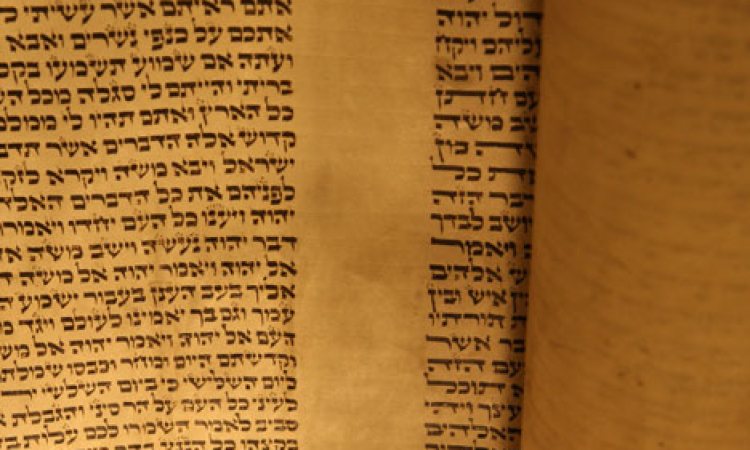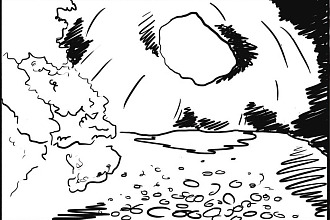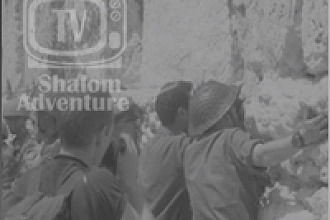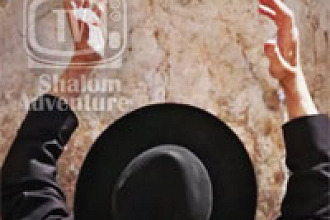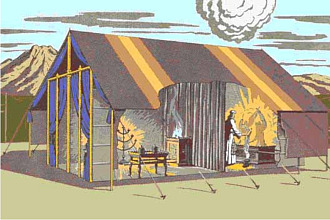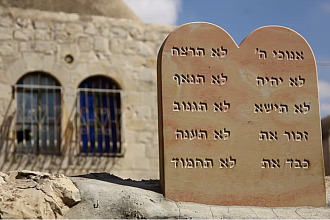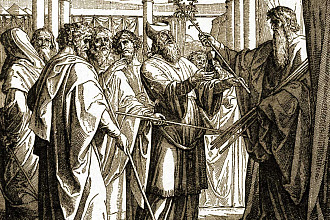Parasha for the Week: Shemini: Leviticus 9:1 – 11:47
Aftarah for the Week: 2 Samuel 6:1 – 7:17
Besorat Yeshua: Romans 12: 16 - 21
Overview
On the eighth day of the dedication of the Mishkan (Sanctuary), Aharon, his sons, and the entire nation bring various korbanot (offerings) as commanded by Moshe.
Aharon and Moshe bless the nation.
G-d allows the Jewish People to sense His Presence after they complete the Mishkan.
Aharon's sons, Nadav and Avihu, present an offering of strange fire. They die on the spot, stressing the need to perform the commandments only as G-d directs.
Moshe consoles Aharon, who grieves in silence.
Moshe directs the kohanim as to their behavior during the mourning period, and warns them that they must not drink intoxicating beverages before serving in the Mishkan.
The Torah lists the two characteristics of a kosher animal: It has split hooves, and it chews, regurgitates, and re-chews its food.
The Torah specifies by name those non-kosher animals which have only one of these two signs.
A kosher fish has fins and easily removable scales.
All birds not included in the list of forbidden families are permitted.
The Torah forbids all types of insects except for four species of locusts.
Details of the purification process after coming in contact with ritually-impure species.
Bnei Yisrael are commanded to be separate and holy — like G-d.
"To be Righteous Inside and on the Outside"
According to the Torah, a kosher animal must have two signs; a split hoof, which is an external sign, and it must chew its cud, which is an internal sign. If the animal has only one of the signs it is deemed not kosher. This teaches us that a believer must be, righteous on the inside as on the outside. Many people make the impression of being good and righteous when in public or when people will know about their actions, but may act differently when in private and no one knows what they did. Some people act nice and proper outside but may not be so nice within their home or the opposite. Thus, the Torah tells us that the sign of being "kosher" is when it is on the inside as on the outside"
"Sacrifices and Repentance"
Moshe (Moses) thought that his brother, Aharon (Aaron) -- the Cohen Gadol (High Priest) had made a mistake regarding an offering and censured him. Aharon explained why his action was proper. The Torah then reports, "And Moshe heard and it was good in his eyes" (Leviticus 10:20). What lesson for life can we learn from Moshe's reaction? Many people, when they find out that they are wrong, become defensive. They are embarrassed by their mistake -- and then try to defend themselves or attack the other person on a character basis, rather than dealing with the facts. If we are aware of this tendency, we can check the urge in ourselves and respond more appropriately. The goal of discussions should be clarity and truth, not defending egos. Rabbi Obadia Sforno elucidates that Moshe felt joy upon hearing the reasoning of Aharon. He had pleasure that Aharon was correct in his decision. This is a wonderful and high-level response. Moshe so loved wisdom and truth -- and his brother Aharon -- that he took great pleasure even though he himself was wrong. Our goal is to strive for truth and clarity.
"Alcoholism"
The Torah commands the Cohanim that: "Wine and other intoxicating beverages you shall not drink" (Leviticus 10:9). The Midrash Vayikra Rabbah (a collection of homiletical stories and insights) warns against alcoholism: "If a person drinks too much wine, he will end up selling all that he owns to keep up his addiction to drinking." The Midrash continues: The children of a drunk were worried that they would soon be penniless. They tied up their father when he was drunk and placed him in a cemetery; they hoped that when he became sober he would be shocked by the experience and become aware of the dangers of drinking to excess.
As Believers in Yeshua haMashiach we are the Cohanim of this time. "Grace and shalom to you from the One who is, who was and who is coming; from the sevenfold Spirit before his throne; and from Yeshua the Messiah, the faithful witness, the firstborn from the dead and the ruler of the earth's kings. To him, the one who loves us, who has freed us from our sins at the cost of his blood, who has caused us to be a kingdom, that is, cohanim for God, his Father — to Him be the glory and the rulership forever and ever. Amen. (Rev. 1:4-6). That means the rules that the Tanach gave to the Cohanim applied to the Cohanim of these days. If we believe in the Messiah and if we are aware that the Almighty called us to be part of this kingdom of Cohanim, then we must not drink any drop of alcohol.
"Keep Your Priorities in Proper Perspective"
A fox once passed by a beautiful garden, filled with row after row of delicious fruits and vegetables. The food looked so tempting, the fox wanted to eat it all. But there was a problem. A tall fence surrounded the garden. The fox went around the entire fence many times determined to get in. Finally, he found a hole in the fence, but it was too small for him to fit through. The fox was not about to give up so easily. "Where there is a will there is a way!" he thought. So he decided to fast until he would be skinny enough to fit through the small opening.
For three straight days, the wily fox fasted. Finally, he was able to fit through the hole. Once inside the garden, he ate to his heart's content.
After enjoying the good life in the garden for some time, it was now time to leave and return to his family. But try as he might, he was now too fat and couldn't squeeze through the hole! He had no choice but to fast another three days until he could squeeze out again.
When he finally made it outside the fence, he turned and looked back. "Garden, garden, how sweet was your fruit!" he said with a shout.
"But what good is it to me; when the way I went in, is the way I came out!"
As we go through life, we too, like the fox, may be tempted to sacrifice real and lasting values for temporary and imaginary gains. Our sages in Pirkei Avot remind us to keep our priorities in proper perspective.
Haftara: 2 Samuel 6:1 – 7:17
Parasha: In the parasha the L-rd wants to impress Israel about the services in the sanctuary, they are holy; we must be careful on how to offer them to our G-d. Aaron's sons, Nadab and Abihu, each took his censer, put fire in it, and laid incense on it; and they offered unholy fire before the LORD, such as he had not commanded them. And fire came out from the presence of the L-RD and consumed them, and they died before the L-RD. (Leviticus 10:1, 2). The text implies that they were under the influence of alcohol when they performed their holy service.
Haftara: In the text of the Parasha the people of Israel forgot the lesson given by G-d to Nadab and Abihu and David went to Baale-Judah to bring the Ark of the Covenant to his house in Jerusalem, The consequences of this move were dramatic, 'David and all the house of Israel were dancing before the LORD with all their might, with songs and lyres and harps and tambourines and castanets and cymbals. When they came to the threshing floor of Nacon, Uzzah reached out his hand to the ark of God and took hold of it, for the oxen shook it. The anger of the LORD was kindled against Uzzah; and God struck him there because he reached out his hand to the ark; and he died there beside the ark of God. (2 Samuel 6:5-7).
This text asks us a question about our own relationship to G-d, His temple and the manner we lead the holy service on Shabbat. Do we perform the service, do we worship our Lord remembering that we are all standing before the Creator of the universe? Serving the L-rd in a proper way is a great blessing. The ark of the LORD remained in the house of Obed-edom the Gittite three months; and the LORD blessed Obed-edom and all his household. (2 Samuel 6:11).
Then David understood that he must perform the service of the L-rd following the Bible instructions and with respect. "So David and all the house of Israel brought up the ark of the LORD..." in the proper manner. (2 Samuel 6:15)
Besorat Yeshua: Romans 12:16 - 21
Parasha: According to the text of the parasha we must be humble before the L-rd and to remember every day that we have a service to perform, which necessitates discernment, You are to distinguish between the holy and the common, and between the unclean and the clean; and you are to teach the people of Israel all the statutes that the LORD has spoken to them through Moses. (Leviticus 10:10-11).
Besorah: Continuing to read Romans 12, verse 16 to 21 we discover several commands the L-rd give to his children in order to perform a service which will be acceptable to him.
1. Live in harmony with one another;
2. Do not be haughty, but associate with the lowly;
3. Do not claim to be wiser than you are.
4. Do not repay anyone evil for evil, but take thought for what is noble in the sight of all.
5. If it is possible, so far as it depends on you, live peaceably with all.
6. Beloved, never avenge yourselves, but leave room for the wrath of God; for it is written, "Vengeance is mine, I will repay, says the Lord."
7. "If your enemies are hungry, feed them;
8. If they are thirsty, give them something to drink; for by doing this you will heap burning coals on their heads."
9. Do not be overcome by evil, but overcome evil with good with the measure of faith God has given you" (Romans 12:16-21).
Living these qualities and advices every day will be a powerful testimony for the L-rd, because everyone will see what the Almighty has done in your life.
Richard-Amram Elofer

